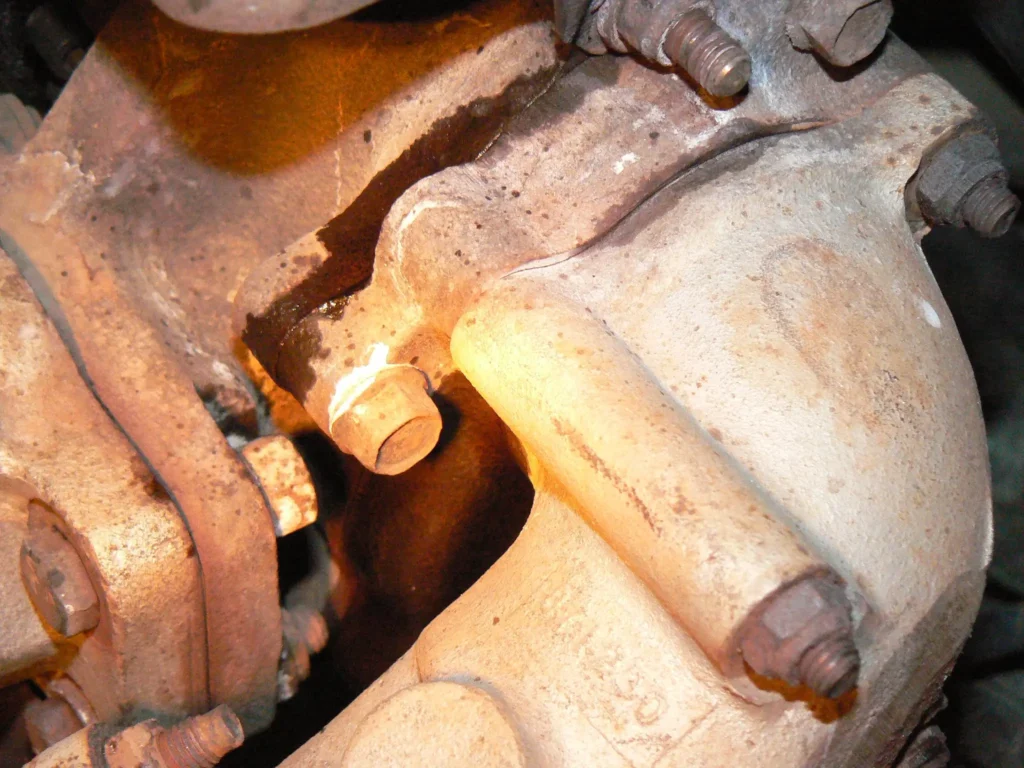You’re cruising down the street, smoothly turning the corner when suddenly – knock, knock! What’s that unsettling sound coming from your car? If you’re hearing a knocking noise when turning at low speed, your vehicle is trying to tell you something important. Let’s dive into the world of automotive diagnostics and uncover the mystery behind this common yet concerning issue.
Understanding the Knocking Noise
Before we jump into the causes, it’s crucial to understand what we’re dealing with. The knocking sound when turning at low speed is typically a repetitive noise that seems to originate from the front of your vehicle.
It might sound like a knock, clunk, or even a pop. This noise is your car’s way of signaling that something in the steering or suspension system needs attention.
Common Causes of Knocking When Turning at Low Speed
-
Worn Ball Joints
Ball joints are the unsung heroes of your car’s suspension system. They connect the control arms to the steering knuckles, allowing for smooth movement as you steer. When these joints wear out, they can cause a knocking sound, especially during low-speed turns.
Signs of worn ball joints:
- Clunking noise when turning
- Uneven tire wear
- Loose or wandering steering
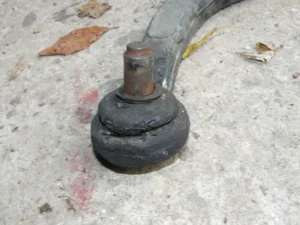
-
Damaged Tie Rod Ends
Tie rods are crucial components that connect your steering system to the wheels. The tie rod ends have ball joints that can wear out over time. When they do, you might hear a knocking or clunking sound during turns.
Symptoms of bad tie rod ends:
- Knocking noise when turning the wheel
- Steering wheel vibration
- Uneven or rapid tire wear
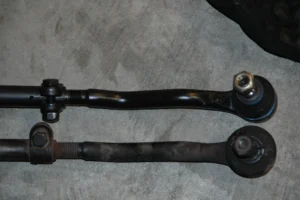
-
Failing CV Joints
Constant Velocity (CV) joints allow your drive shafts to transmit power at various angles while accommodating the up-and-down motion of the suspension. When these joints wear out, they can cause a clicking or popping noise during turns.
Indicators of CV joint problems:
- Clicking noise when turning
- Grease on the inside edge of the tire
- Vibration while driving
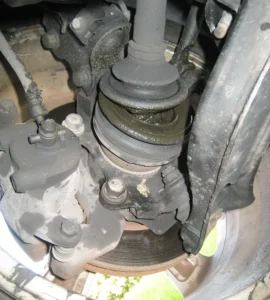
-
Loose or Worn Steering Rack
The steering rack is the heart of your car’s steering system. If it becomes loose or worn, it can cause a knocking sound when you turn the wheel. This issue is often accompanied by a feeling of looseness in the steering.
Signs of steering rack issues:
- Knocking or clunking when turning
- Loose or wandering steering
- Difficulty centering the steering wheel
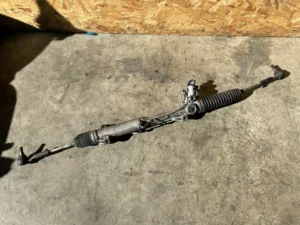
-
Strut Mount Problems
Strut mounts provide a cushion between the strut assembly and the vehicle’s body. When these mounts wear out, they can cause a knocking sound, especially during low-speed turns.
Symptoms of failing strut mounts:
- Knocking noise when turning
- Excessive bounce after hitting bumps
- Steering wheel vibration
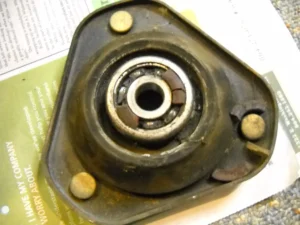
-
Low Power Steering Fluid
Sometimes, the culprit behind the knocking sound isn’t a worn part but simply low power steering fluid. When the fluid is low, air can enter the system, causing a knocking or whining noise when you turn the wheel.
Signs of low power steering fluid:
- Knocking or whining noise when turning
- Difficulty turning the steering wheel
- Visible fluid leaks under the car
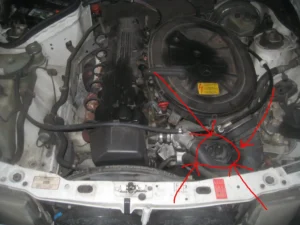
Diagnosing the Issue
While it’s tempting to play detective and diagnose the issue yourself, steering and suspension problems can be tricky to pinpoint without proper tools and expertise. However, here are some steps you can take:
- Listen carefully: Try to identify where the noise is coming from. Is it from the front left, front right, or center of the car?
- Observe patterns: Does the noise occur only during left turns, right turns, or both? Does it happen at all speeds or only when driving slowly?
- Check for visible damage: Look for any obvious signs of wear or damage to your tires, wheel wells, or under the car.
- Test the steering: With the car parked, turn the steering wheel from lock to lock. Listen for any unusual noises.
- Professional inspection: If you’re unsure or the problem persists, it’s best to have a professional mechanic inspect your vehicle.
The Importance of Timely Repairs
While a knocking noise might seem like a minor annoyance, ignoring it can lead to more severe problems down the road. Worn steering and suspension components can compromise your vehicle’s handling, potentially leading to dangerous driving conditions.
Moreover, what starts as a simple repair can escalate into a more costly fix if left unattended.
Preventative Maintenance: Keeping the Knock Away
The best way to deal with knocking noises is to prevent them from happening in the first place. Regular maintenance can go a long way in keeping your car’s steering and suspension system in top shape:
- Regular inspections: Have your steering and suspension components checked during routine maintenance.
- Timely lubrication: Ensure all greasable joints are properly lubricated according to your vehicle’s maintenance schedule.
- Alignment checks: Regular wheel alignments can prevent uneven wear on steering and suspension components.
- Fluid checks: Regularly check and top up your power steering fluid.
- Prompt repairs: Address any unusual noises or handling issues promptly to prevent further damage.
Frequently Asked Questions
Is it safe to drive with a knocking noise when turning?
While you might be able to drive short distances, it’s not safe to continue driving with this issue. The knocking could indicate a serious problem that might lead to loss of control if left unaddressed.
How urgent is it to fix a knocking noise when turning?
It’s quite urgent. The knocking noise indicates that a component in your steering or suspension system is worn or damaged. Continuing to drive could lead to further damage or potential safety hazards.
What’s the average cost range for repairing a knocking noise when turning?
The cost can vary widely depending on the cause, from as little as $20 for a power steering fluid top-up to over $1000 for major suspension repairs. A professional diagnosis is the best way to get an accurate estimate.
Can weather conditions cause knocking noises when turning?
While weather doesn’t directly cause knocking, extreme conditions can accelerate wear on steering and suspension components. Cold weather, in particular, can make existing issues more noticeable.
How long do steering and suspension components typically last?
The lifespan of these components varies greatly depending on driving conditions and maintenance. However, many components can last 50,000 to 100,000 miles or more with proper care.
Can I diagnose the cause of the knocking noise myself?
While you can perform basic checks, accurately diagnosing steering and suspension issues often requires specialized knowledge and tools. It’s best to have a professional mechanic perform a thorough inspection.
Conclusion
A smooth, quiet ride is not just a luxury – it’s an indicator of a well-maintained vehicle. If you’re experiencing a knocking noise when turning at low speed, don’t ignore it. Whether it’s a worn ball joint, a failing CV joint, or simply low power steering fluid, addressing the issue promptly can save you from more expensive repairs and ensure your safety on the road.
Remember, your car communicates with you through various sounds and sensations. By staying attentive to these signals and maintaining your vehicle regularly, you can enjoy many miles of smooth, quiet driving. So the next time you hear a knock, don’t panic – just listen to what your car is trying to tell you and take action accordingly.

